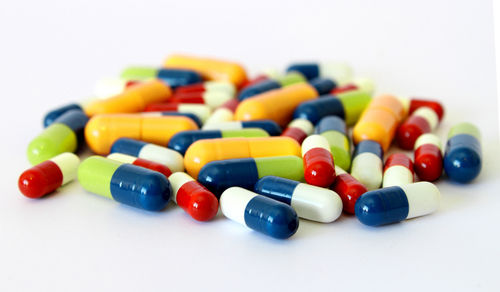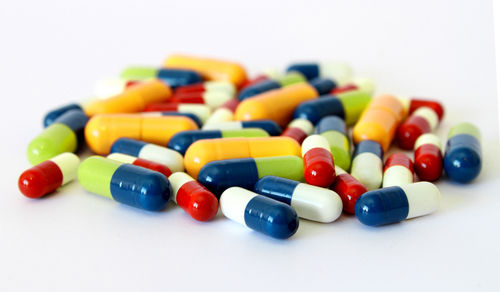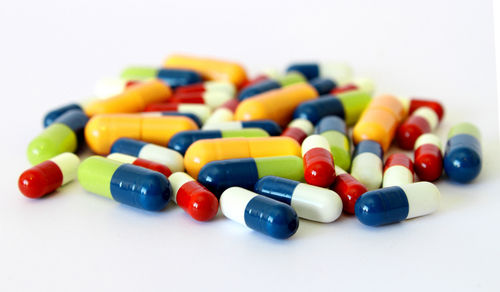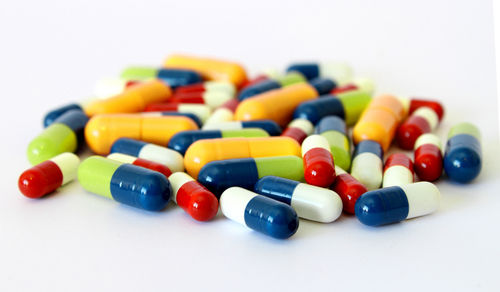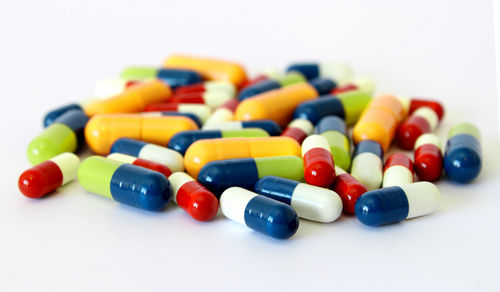
Mecobalamin, B1, ALA & Folic Acid Capsules
74 INR/Box
Product Details:
- Purity 99%
- Formulations Type General Drugs
- Formulations Form Capsules
- Gender/Age Group Adult
- Storage Instructions Dry Place
- Click to view more
X
Mecobalamin, B1, ALA & Folic Acid Capsules Price And Quantity
- 74 INR/Box
- 300 Box
Mecobalamin, B1, ALA & Folic Acid Capsules Product Specifications
- General Drugs
- Capsules
- Dry Place
- 99%
- Adult
Mecobalamin, B1, ALA & Folic Acid Capsules Trade Information
- Cash in Advance (CID) Cash Advance (CA)
- 300 Box Per Month
- 1 Months
- Yes
- Sample costs shipping and taxes has to be paid by the buyer
- Western Europe Australia South America Eastern Europe Middle East Central America Asia North America Africa
- All India
Product Description
Mecobalamin or methylcobalamin, one of several forms of vitamin B12. It is among the cobalamin family of compounds, and as the properly spelled name attests, it contains an attached methyl group. It is naturally produced by bacteria and is often present in the human body at low levels. It also has pharmaceutical applications in the treatment of a number of conditions, and is clinically relevant in the case of patients with Arakawa's syndrome II, a metabolic disorder characterized by the inability to metabolizemecobalamin.Vitamin B12 is an important vitamin for the human body. This water-soluble compound plays a role in neurological function, and is also involved in the process of producing blood.Mecobalamin can be used in the treatment of anemia when a patient has a B12 deficiency, and it is also employed in the care of patients with neurological disorders. Neuropathy, where the peripheral nervous system does not function normally and patients experience numbness, tingling, and other symptoms, can be treated with mecobalamin. The drug is also used in the early treatment of amyotrophic lateral sclerosis.
In patients with Arakawa's syndrome II, mecobalamin in the body cannot be adequately processed. This leads to neurological deficiencies, as the nervous system and brain are not able to access the B12 they need. Patients can experience a variety of problems related to the nervous system, ranging from gastrointestinal distress related to poorly functioning nerves in the gut to learning disabilities associated with interruptions in brain function.
Methyl cobalamin is a cobalamin used in the treatment of peripheral neuropathy, diabetic neuropathy, and as a preliminary treatment for amyotrophic lateral sclerosis. It is a form of vitamin B12 and differs from cyanocobalamine in that the cyanide is replaced by a methyl group. Methylcobalamin is produced by some bacteria. It plays an important role in the environment. In the environment, it is responsible for the biomethylation of certain heavy metals. For example, the highly toxic methyl mercury is produced by the action of methylcobalamin.[4] In this role, methylcobalamin serves as a source "CH3+".
Folic acid:
Folic acid (also known as folate (the form naturally occurring in the body), vitamin B9, vitamin Bc (or folacin), pteroyl-L-glutamic acid,pteroyl-L-glutamate, and pteroylmonoglutamic acid. are forms of the water-soluble vitamin B9. Folic acid is itself not biologically active, but its biological importance is due to tetrahydrofolate and other derivatives after its conversion to dihydrofolic acid in the liver.Vitamin B9 (folic acid and folate) is essential to numerous bodily functions. The human body needs folate to synthesize DNA, repair DNA, and methylate DNA as well as to act as a cofactor in certain biological reactions. It is especially important in aiding rapid cell division and growth, such as in infancy and pregnancy. Children and adults both require folic acid to produce healthy red blood cells and prevent anemia.
Advantages:
Effective for:
â— Treating and preventing folic acid deficiency.Likely Effective for:
â— Lowering homocysteine levels in people with kidney disease. About 85% of people with serious kidney disease have high levels of homocysteine. High levels of homocysteine have been linked to heart disease and stroke. Taking folic acid lowers homocysteine levels in people with serious kidney disease.
â— Lowering homocysteine levels ("hyperhomocysteinemia") in people with high amounts of homocysteine in their blood. High levels of homocysteine have been linked to heart disease and stroke.
â— Reducing harmful effects of a medicine called methotrexate, which is sometimes used to treat rheumatoid arthritis and psoriasis. Taking folic acid seems to reduce nausea and vomiting, which are possible side effects of methotrexate treatment.
â— Decreasing the risk of certain birth defects (neural tube defects) when taken by pregnant women.
Alphalipoic acid:
Alpha lipoic acid is a fatty acid found naturally inside every cell in the body. It's needed by the body to produce the energy for our body's normal functions. Alpha lipoic acid converts glucose (blood sugar) into energy.Alpha lipoic acid is also an antioxidant, a substance that neutralizes potentially harmful chemicals called free radicals
Why Take Alpha Lipoic Acid
Besides taking ALA for its general benefits as an antioxidant, studies have shown that alpha lipoic acid can help with the following conditions:
â— Hypertension (High Blood Pressure)
â— Coronary Heart Disease
â— Metabolic Syndrome (high blood pressure and elevated cholesterol
â— Peripheral Neuropathy (caused by diabetes and other conditions, such as Lyme disease, alcoholism, shingles, thyroid disease and kidney failure)
â— Diabetes (improving glucose metabolism and helping diabetics utilize insulin better)
â— Liver Disease
â— Metastatic Pancreatic Cancer (increasing long-term survival)
â— Impaired Brain Function (as a treatment for stroke and other brain disorders involving free radical damage, including Alzheimer's disease)
â— Effects of Aging (improving blood flow and enhancing immune function, restoring levels of glutathione, a protective antioxidant and detoxification compound)
â— Degenerative Diseases (ALA is a strong anti-inflammatory agent)
â— Glaucoma and Cataracts
Storage:
Store in cool and dry place.
Tell us about your requirement

Price:
Quantity
Select Unit
- 50
- 100
- 200
- 250
- 500
- 1000+
Additional detail
Mobile number
Email


